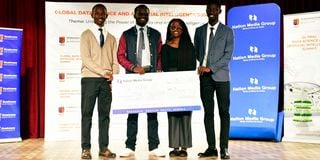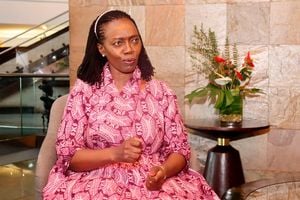KU team wins hackathon contest with AI solution for media houses

Team X members (from right) Myles Mburu, Jackson Obere, Wambui Karanja and Delbert Kipyegon after emerging top during the Global Data Science and Artificial Intelligence Summit in Nairobi on November 15, 2024.
What you need to know:
- Solution was picked by a team of judges from NMG and Strathmore University’s iLabAfrica.
- The second and third prizes were clinched by SignSema and Team Rubani respectively.
An innovation that uses data and artificial intelligence to target news and advertisements to local audiences has bagged the top prize at the Nation Media Group’s inaugural hackathon, with its creators taking home $1,000 (Sh129,020) to further develop their solution.
LocaleConnect, a solution developed by a group of Kenyatta University computer science students going by the name Team X, promises to boost rural Kenyans’ interaction with news and journalistic content as well as advertising, helping boost revenues and audience engagement for the Nation Media Group (NMG).
It was picked by a team of eight judges drawn from NMG and Strathmore University’s iLabAfrica as the most innovative, scalable, and responsive solution to the current problems facing the media industry.
“We developed this project because we understand how people value localised news, how people value their community and knowing what’s going on around their community,” said Wambui Karanja, a member of the team. Other members of the team are Jackson Obere, Myles Mburu, and Delbert Kipyegon.
Their innovation is currently at a prototype stage – a preliminary development phase – and they plan on utilising the prize money and the support and mentorship they’ll receive from NMG and iLabAfrica.
The second and third prizes were clinched by SignSema and Team Rubani respectively, taking home $700 (Sh90,314) and $550 (Sh70,961).
SignSema was developed by two mechatronics engineering students from Jomo Kenyatta University of Science and Technology – Mark Maara and Derick Kirimi – and is a solution that uses artificial intelligence to automate translation to sign language of video and audio, especially for TV broadcasting and online streamed content.
“The problem we’re solving is that for normal TV channels, the only section that is translated to sign language is the news, but all other programmes are not, and a lot of audiences are lost because of that,” said Mr Maara.
Team Rubani’s solution, which is also AI-powered, is meant to boost NMG’s content creation by automating transcription of video and audio for journalists, as well as optimising the content for easier and quicker finding on search engines.
“We’re automating this transcription for the journalists so that they can focus on the more creative tasks. We’re not trying to replace the journalists; we’re just empowering them,” explained Collins Wanjao, a member of the team.
The Rubani Team consists of data scientists Wanjao, Trixie Moek, and Richard Gachiri, and Elizabeth Thuo, who is a final-year student of Economics and Statistics at the University of Nairobi.
NMG’s Chief Information Officer Russell Akuom, who was the mastermind of the hackathon, said it was largely a success and has exemplified how technology can be used to support the media industry.
“I essentially believe that the impact of this hackathon is going to transcend just the prizes that they’ve received and go to a level where they’ll make connections in the industry and help the industry develop products that are relevant to the audiences that we’re targeting,” Mr Akuom said.
“Being the inaugural hackathon, we found a niche that nobody tapped into – getting the young minds to relook into how people consume news,” said Dr John Olukuru, head of data science at iLabAfrica.
Mr Olukuru said that the other three solutions that made it to the final but didn’t scoop the final prizes will also receive support from the institution to further sharpen their ideas.
Monica Ndungu, NMG’s chief operating officer, said the winning solutions will be instrumental in solving the challenges brought upon the media industry by the digital age.
“There’s definitely a scope for us to find solutions for challenges that we face as a business,” she said.



